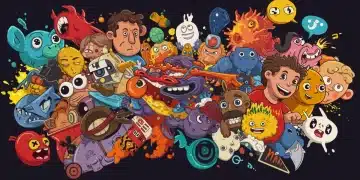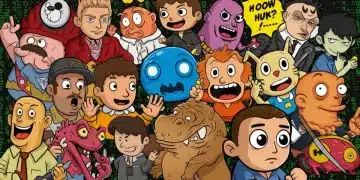How Gen Z Is Reshaping Social Trends in 2025: From Digital Minimalism to Conscious Influence

Gen Z is not just participating in social trends—they’re rewriting the rules. In 2025, we’re seeing a massive shift led by Zoomers toward digital minimalism, ethical consumerism, and a new wave of “conscious influence” that favors authenticity over perfection. This blog post explores how Gen Z is reshaping the digital world, brand culture, and activism—one TikTok at a time.
As the first generation raised entirely in the digital age, Gen Z (born between 1997–2012) is transforming what it means to connect, consume, and care. In 2025, their influence spans far beyond TikTok dances and viral memes. Gen Z is driving powerful changes in how society communicates, shops, and even thinks. Forget trend-chasing — Gen Z is trend-making.
💡 What Makes Gen Z Different in 2025?

Gen Z is increasingly described as the most connected yet emotionally aware generation. They are digital natives who have grown up with the internet in their pocket, but they are also deeply critical of its effects. Their awareness and literacy in social issues, technology, and mental health make them culturally agile and value-driven in how they interact with the world.
They don’t just follow trends — they deconstruct and rebuild them. Gen Z questions the status quo, and when they don’t like something, they create something better. Whether that’s through open-source platforms, independent creator networks, or new forms of activism, their influence is not performative — it’s participatory.
1. Digital Minimalism is the New Aesthetic
In a world overwhelmed by constant notifications, algorithm-driven content, and the pressure to be always “online,” Gen Z is pushing back with the philosophy of digital minimalism. This concept goes beyond just deleting unused apps or cutting screen time; it’s about reclaiming control over technology and designing a healthier, more intentional digital life.
According to a 2024 report by Common Sense Media, average daily screen time for teenagers has dropped from nearly 7 hours in 2019 to about 4.7 hours in 2025, indicating a conscious effort to reduce digital overload. This decline is significant given how embedded tech is in daily life—from education and socialization to entertainment.

Many Gen Zers are now adopting practices such as:
- App detoxes where they uninstall or restrict access to distracting social media platforms for days or weeks at a time.
- Scheduled “phone-free” hours, especially during meals or social gatherings, to foster real-life connection.
- Switching to grayscale phone screens to reduce visual stimulation and the addictive quality of colorful app icons.
- Using productivity apps like Forest, which gamifies focus time by growing a virtual tree the longer you stay off your phone.
For more insights on how Gen Z is embracing digital minimalism as a form of self-care, read this article on Medium.
These behavioral changes aren’t just individual choices—they’re part of a broader cultural shift. Brands and tech companies have taken notice and responded by creating features like TikTok’s “Screen Time Management” and Instagram’s “Quiet Mode,” helping users set boundaries within apps.
Furthermore, minimalism influences Gen Z’s content consumption. Many are gravitating toward fewer but higher-quality digital experiences, such as podcasts, newsletters, and long-form videos that provide depth rather than endless scrolling. Platforms like Substack and Clubhouse have grown in popularity as alternatives to the high-intensity feeds of mainstream social media.
This trend also affects social media aesthetics. The hyper-curated, overly filtered “Instagram-perfect” feeds are giving way to more raw and authentic content, often with minimal editing. Gen Z’s preference for honesty over polish is transforming the visual language of the internet.
On a deeper level, digital minimalism aligns with Gen Z’s values of mental health awareness. Studies from the American Psychological Association link excessive social media use with increased anxiety and depression, particularly among teens and young adults. By limiting exposure, Gen Z seeks to protect their emotional wellbeing and cultivate mindfulness in a digital age.
In summary, digital minimalism is more than a passing fad. It represents Gen Z’s evolving relationship with technology—one that prioritizes intentional use, mental clarity, and meaningful connection over noise and distraction. As this generation moves into adulthood, their approach is likely to influence how tech is designed and consumed for years to come.
2. Conscious Influence > Clout Chasing

The influencer culture that dominated the 2010s was often criticized for promoting unattainable lifestyles, over-curated images, and shallow brand endorsements. However, by 2025, Gen Z has fundamentally reshaped this dynamic, favoring what’s been called “conscious influence.” This means transparency, authenticity, and ethical alignment have become the pillars of effective influence.
Learn more about how Gen Z’s values influence their brand loyalty in this Vogue Business article.
Unlike earlier social media stars who prioritized follower count and viral fame, today’s Gen Z creators are building engaged communities based on trust and shared values. They openly discuss topics once considered taboo or off-limits, such as mental health struggles, identity, and social justice.
Take creators like Tefi Pessoa, a popular Brazilian influencer known for her candid conversations about anxiety and body positivity, or Bretman Rock, whose unapologetic humor and openness about his LGBTQ+ identity have garnered millions of loyal followers. Their success demonstrates that vulnerability can be a powerful tool for connection.
Engagement data backs this up: studies show that authentic, unfiltered content can generate up to three times more interaction than highly polished posts. Audiences are hungry for creators who don’t just show the highlight reel but share real-life ups and downs.
Sponsored content has also evolved. Gen Z followers are quick to detect and reject inauthentic brand deals. This has forced creators and companies alike to seek partnerships grounded in genuine alignment. Brands that support sustainability, diversity, mental health, or community initiatives tend to resonate better than those focused purely on sales.
For example, the sustainable fashion brand Reformation has successfully partnered with influencers who prioritize environmental responsibility, resulting in campaigns that feel honest rather than salesy. This contrasts sharply with past influencer marketing, which often relied on superficial product placement.
The shift toward conscious influence presents new challenges for creators. Balancing authenticity with monetization requires navigating ethical dilemmas—deciding which brands to work with, how transparent to be about sponsorships, and managing the pressures of constant online scrutiny.
Many Gen Z creators are taking control by launching their own product lines or platforms that reflect their values. This entrepreneurial spirit further blurs the lines between influencer and impact maker, emphasizing agency and responsibility.
Ultimately, conscious influence is about cultivating meaningful, two-way relationships with audiences—something that transcends follower counts and turns social media into a space for real dialogue and change.
3. The Rise of Ethical Consumption
Ethical consumption is not just a buzzword for Gen Z; it’s a fundamental shift in how this generation approaches buying decisions. More than ever, they are demanding transparency, responsibility, and accountability from brands. For them, every purchase is a reflection of their values and worldview.
This mindset has fueled the explosive growth of the secondhand and resale markets. According to a recent report by ThredUp, the global resale market is projected to reach $77 billion by 2025, with Gen Z leading the charge. Platforms like Depop, Poshmark, and eBay have become digital thrift stores where users buy and sell clothes with stories, history, and sustainability attached.
But ethical consumption extends beyond fashion. Gen Z scrutinizes everything from food sourcing to tech manufacturing. They research brands’ supply chains, labor practices, and environmental footprints using social media, watchdog organizations, and community reviews. If a company falls short, Gen Z is quick to “cancel” or boycott, making social accountability a powerful force.
Take the skincare brand Drunk Elephant, for example. While popular, the brand faced criticism for not being fully transparent about ingredient sourcing and sustainability efforts. This led to vocal feedback from conscious consumers demanding more ethical practices.
Meanwhile, brands like Patagonia and Allbirds have cultivated loyal followings by leading with strong environmental commitments and transparent supply chains. Their success demonstrates that sustainability is not just a niche but a competitive advantage.
Gen Z is also pioneering the trend of “slow consumption,” valuing quality over quantity and favoring timeless pieces instead of fast fashion. This approach challenges traditional retail models and encourages circular economies—where products are designed for durability, repairability, and recyclability.
Social media amplifies this movement, with hashtags like #ThriftFlip and #SustainableStyle trending on platforms like TikTok and Instagram. Creators showcase DIY clothing transformations, share brand reviews, and educate peers on ethical shopping.
According to a First Insight report, 62% of Gen Z shoppers prefer to buy from sustainable brands, and 73% are willing to pay more for sustainable products
This level of consumer activism has ripple effects throughout the supply chain. Manufacturers and retailers must invest in transparency, fair labor practices, and eco-friendly innovations to stay relevant to Gen Z buyers.
In summary, ethical consumption for Gen Z is a powerful blend of personal values, community influence, and social responsibility. This generation is proving that consumer choices can be a catalyst for positive global change.
🧃 Snapshot: Gen Z’s Core 2025 Values
4. Micro-Activism Is the New Norm

Gen Z’s approach to activism is revolutionary in its accessibility and digital-first nature. Unlike previous generations that relied heavily on large-scale protests or traditional lobbying, Gen Z activists harness social media platforms to create change through micro-activism—small, bite-sized acts that collectively build momentum.
Micro-activism includes sharing educational posts, signing online petitions, participating in viral challenges, donating small amounts to causes, and amplifying marginalized voices. These actions may seem small individually but accumulate into substantial cultural and political impact.
For instance, TikTok campaigns like the #VoterRegistrationChallenge have led to tens of thousands of new voter registrations across the U.S., particularly among young people who were historically less likely to vote. Similarly, Instagram story chains highlighting mental health resources have created supportive online communities that break stigma.
Platforms like Discord and Telegram have become hubs for organizing grassroots efforts, fostering local community projects, and mobilizing resources quickly. This digital activism enables a more diverse range of participants—including those who may not have the time, money, or physical ability to attend traditional protests.
However, this style of constant engagement comes with challenges. Many young activists speak openly about the risk of burnout, emotional exhaustion, and the mental health toll of witnessing global crises and online harassment.
Discover how Gen Z is turning to nature bathing as a way to digitally detox and find mental clarity in this Times of India article
In response, Gen Z is pioneering new models of self-care and sustainability within activism itself. Ideas like “activism sabbaticals,” setting boundaries on social media use, and focusing on small, achievable goals help maintain long-term involvement without compromising wellbeing.
Moreover, micro-activism is blending digital efforts with offline action. Many Gen Z activists organize local meet-ups, volunteering, and community projects to complement their online presence, ensuring tangible change beyond screens.
This hybrid model strengthens movements by building real-world networks and fostering intergenerational cooperation, merging traditional activism’s lessons with new digital tools.
Overall, micro-activism represents a democratization of social change, empowering more voices and diversifying participation. In 2025, it’s clear that the future of activism will be digitally connected, community-focused, and sustainability-minded—all hallmarks of Gen Z’s influence.
📈 Final Thoughts: What This Means for Brands & Culture
Gen Z is not just a market demographic — they’re a movement. Their demand for transparency, emotional honesty, and global awareness is disrupting entire industries. If brands, platforms, or influencers want to remain relevant, they’ll need to align with this generation’s deeper values.
Expect fewer “influencers” and more “impact makers.” Fewer filters and more truths. In 2025, Gen Z is shaping a world where being real is revolutionary — and we’re all invited to follow their lead.





